The world of business in Africa is growing fast, catching the eye of investors and entrepreneurs. With many new business chances popping up, it’s key to know the top places to start a business. Economic changes, new tech, and forward-thinking government policies are making Africa a great place for new ideas and growth.
In this guide, we’ll look at different countries and what makes them special. We’ll show you where you can make the most of the growing African market.
Overview of the African Business Landscape

The African business scene is changing fast, with big shifts in the economy and a growing middle class. The outlook for businesses is good, with a 3.4% GDP growth expected in 2023. This shows Africa’s strength after the pandemic.
There’s also a big leap in digital technology, opening up new ways for innovation. This makes Africa a great place for businesses, drawing in investors from around the world. They want to use Africa’s vast resources and talent.
- Growth of entrepreneurial ecosystems
- Increased access to technology
- Strategic partnerships with international firms
Africa has a huge chance for entrepreneurs, thanks to better support and government help for small businesses. These factors make Africa a top choice for investment and business growth.
Factors to Consider When Starting a Business in Africa

Starting a business in Africa comes with its own set of challenges and opportunities. Entrepreneurs need to think about economic stability, rules, and how to get funding. These factors are crucial for success.
Economic Stability
Economic stability is key for businesses in Africa. Changes in currency and inflation can affect profits. Countries like Rwanda and Kenya have more stable economies, attracting foreign investors.
Stable policies lead to better results for investors. It’s important to know about African economic indicators before starting a business.
Regulatory Environment
Understanding the rules is essential before starting a business. Different countries in Africa have different regulations. Knowing the laws can help avoid problems.
Countries like Rwanda and Kenya have easier rules, helping businesses grow. The World Bank’s Ease of Doing Business Index shows this. Following the rules is not just legal; it also builds trust with others.
Access to Funding
Finding funding is a big challenge for African entrepreneurs. But, new funding options are emerging. Venture capital and government support are helping.
Nigeria’s tech scene is getting a lot of money, showing a growing interest in investing. In 2021, over $1.1 billion was invested, a big sign of change.
Top African Nations for Entrepreneurs

African nations are quickly becoming great places for starting businesses. Countries like Nigeria and Kenya have seen big economic growth. They have policies that help new businesses grow.
Rwanda is known for making it easier to start a business. The government has made rules simpler. South Africa also has a strong economy and lots of resources for entrepreneurs.
Ghana is known for being stable, which is key for businesses. It has good rules and growing markets. These countries are top picks for starting new businesses in Africa.
Best countries in Africa to start a business
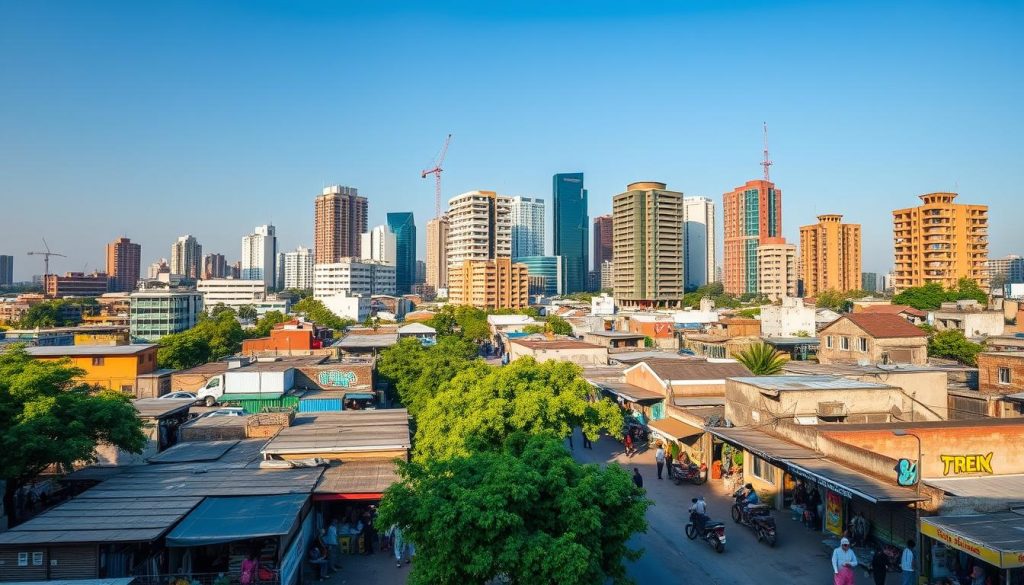
Africa is full of new markets waiting for entrepreneurs. Countries like Ghana and Uganda are growing fast. They are seeing more people moving to cities and more people wanting to buy things.
This means big chances for businesses in many areas. It’s a great time to invest in these countries.
Emerging Markets and Growth Potential
Ghana and Uganda are at the forefront of Africa’s growth. They are showing fast economic progress. The International Monetary Fund believes these countries will keep growing.
Entrepreneurs can look into different fields. This includes farming, tech, and green energy.
Government Support and Incentives
African governments are helping businesses grow. They have special plans for entrepreneurs to attract more investment. This support includes tax breaks and grants.
Places like South Africa and Kenya are leading the way. They are making it easier for new businesses to start and grow.
Nigeria: A Hub for Innovation
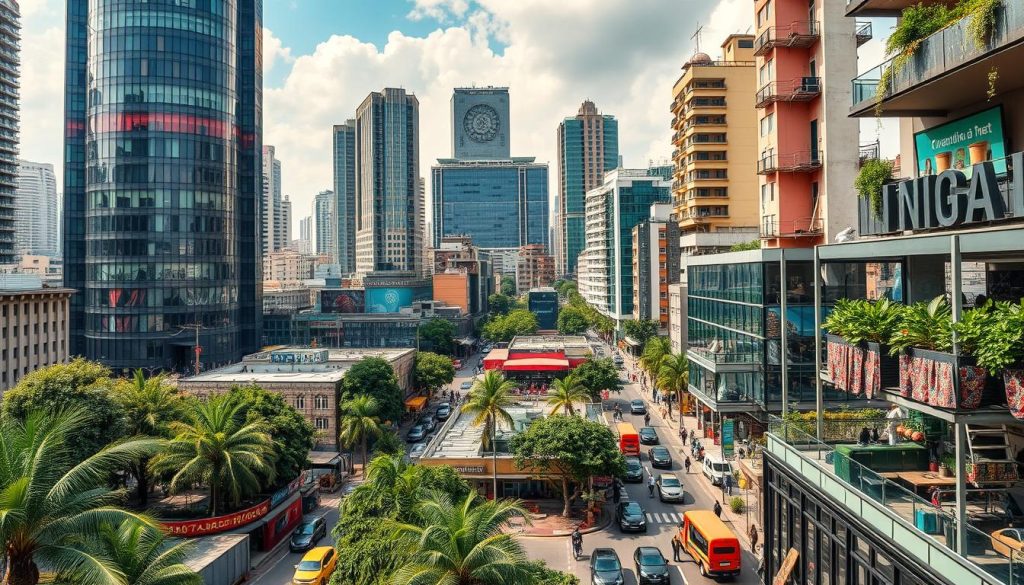
Nigeria is a key player in Africa, known for its thriving start-up scene. Lagos, the commercial heart, is a hotbed of innovation. It’s filled with entrepreneurs and cutting-edge tech.
Vibrant Start-up Ecosystem
Over 200 tech start-ups were active in Nigeria in 2022, according to Statista. This growth shows Nigeria’s commitment to innovation. Tech incubators and accelerators support new businesses, offering mentorship and funding.
Investment Opportunities Across Sectors
Nigeria is not just about tech; it has opportunities in agriculture, telecommunications, and entertainment too. These sectors attract foreign investors, boosting the economy. They create jobs and drive growth, making Nigeria’s economy stronger.
South Africa: A Diverse Economy
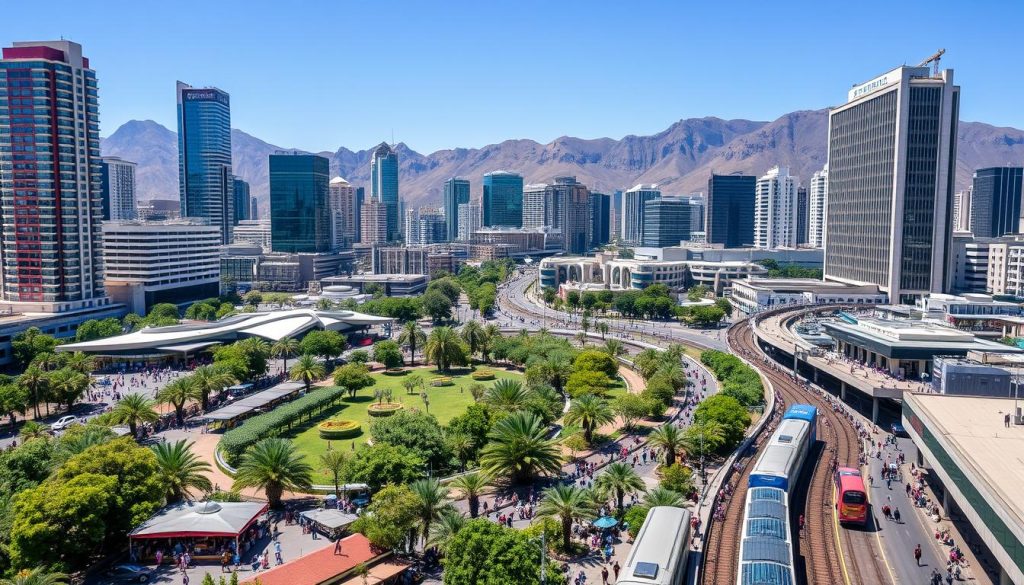
South Africa is known for its strong infrastructure and many resources for businesses. It has a diverse economy, making it attractive to entrepreneurs and investors. The country’s advanced logistics and skilled workers make it a great place for businesses to succeed.
Infrastructure and Resources
The business infrastructure in South Africa is key for smooth operations. The World Economic Forum praises South Africa for its infrastructure, ranking it high in Africa. Businesses have access to reliable energy, good transport, and modern telecoms, helping them grow.
Access to International Markets
South Africa is well-placed for global business. Being part of BRICS and the African Union, it has trade agreements that help with international trade. These agreements make it easier for businesses to enter new markets and find export opportunities.
Kenya: A Growing Tech Scene

Kenya is quickly becoming a tech leader in Africa. This is thanks to its big steps in mobile payments. M-Pesa has changed how people handle money, making Kenya a key player in tech.
This platform has helped people send money easily. It has also inspired many to start new businesses that meet local needs.
The focus on innovation in Kenya is helped by a strong start-up and investor scene. The government supports the digital economy with efforts to improve connectivity and access to tech. These efforts help new ideas grow and businesses succeed.
- Access to affordable mobile services
- Investment in ICT infrastructure
- Supportive policy frameworks for tech development
As tech education gets better and more people notice Kenya’s innovation, the country is set for growth. More tech hubs and incubators show the potential of this lively scene. It looks like the digital economy in Kenya is set for a bright future.
Ghana: Stability and Growth

Ghana is known for its political stability and strong business environment. It’s a great place for entrepreneurs. The government works hard to help small businesses grow.
Support for Small Enterprises
The government of Ghana has many support programs for small and medium-sized businesses. These programs help entrepreneurs by giving them the tools they need to start a business.
Some key parts of these programs are:
- Access to funding through grants and low-interest loans.
- Training and mentorship opportunities to enhance business skills.
- Available tax incentives aimed at encouraging investment in SMEs.
This support helps small businesses grow. It also creates jobs and boosts the economy.
Rwanda: The Land of a Thousand Start-ups

Rwanda is a top choice for entrepreneurs looking for a great business climate. The government is fully behind supporting new businesses. They’ve made it easier to start and run a business, thanks to new rules and support.
Ease of Doing Business
Rwanda is known globally for its business-friendly environment. In 2020, it ranked 38th in the Ease of Doing Business Index by the World Bank. This shows Rwanda’s efforts to make starting a business easy.
What makes Rwanda stand out includes:
- Streamlined business registration processes.
- Efficient tax compliance measures.
- Transparent regulatory frameworks.
Government Initiatives for Entrepreneurs
The Rwandan government has launched many programs to support entrepreneurs. The Youth Employment Programme is one example, focusing on young business owners. It offers training, mentorship, and financial help to new businesses.
More initiatives have made Rwanda a great place for innovation and growth. This creates a supportive environment for entrepreneurs.
Uganda: The Pearl of Africa for Business

Uganda is known for its huge business potential. This comes from its vast natural resources. Entrepreneurs will find minerals, oil, and fertile land, boosting the economy.
Natural Resources and Economic Development
The country’s natural wealth is key to its economy. Uganda has oil, gas, gold, and cobalt. These resources help local businesses and draw in foreign investors.
The government has worked hard to improve infrastructure and trade policies. These efforts help create a good environment for businesses. This has led to Uganda’s economy growing fast, with a 6% increase expected soon. This shows great chances for investors.
Egypt: Gateway to Africa and the Middle East
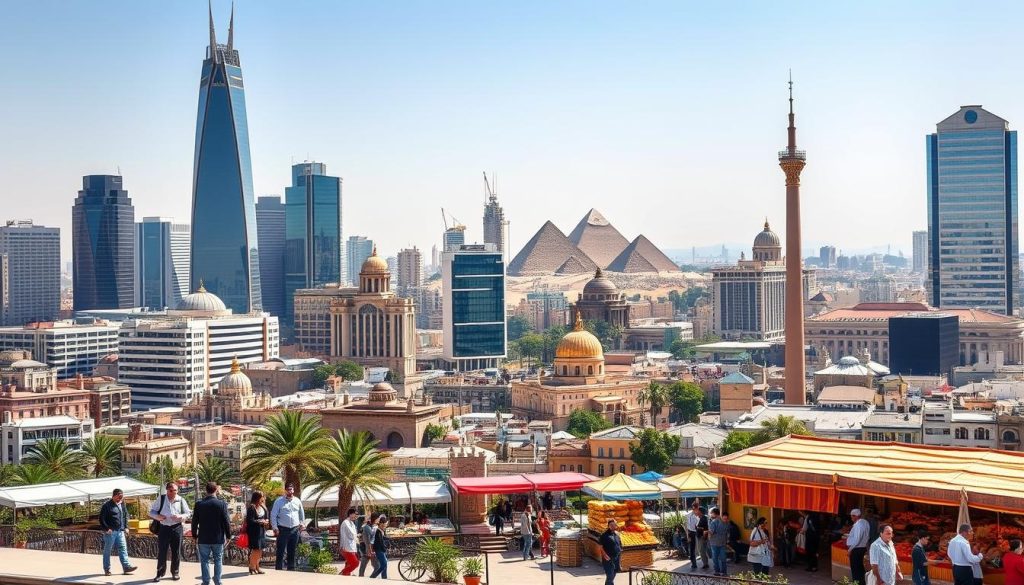
Egypt is a key link between Africa and the Middle East. It’s playing a big role in global trade. The government is working hard to make the economy better, attracting more foreign investment.
There are many chances to invest in Egypt, like tourism, farming, and green energy. These areas are growing fast.
The business scene in Egypt is getting better, making it easier for new businesses to start. The government is focusing on helping investors in different fields. This is to draw in more foreign money.
Investors get special deals, like tax cuts and easier rules. These help make doing business in Egypt easier. This is good for the economy, making it a lively place for both local and international businesses.
Zimbabwe: Resilience and Untapped Markets
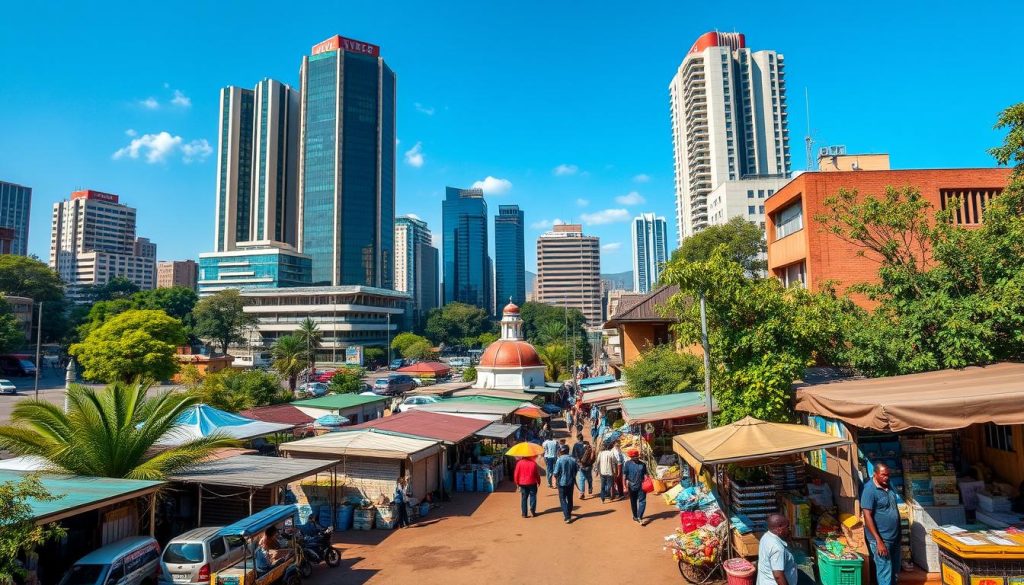
The business scene in Zimbabwe is both challenging and full of opportunities. Despite economic ups and downs, the country has shown great resilience. Now, with the government working to stabilise the economy, it’s open to investors from home and abroad.
Several sectors are showing great promise for growth. These include agriculture, mining, and technology. Each of these areas offers unique chances for success.
Sectors with High Growth Potential
For those looking to invest in Zimbabwe, here are some key sectors to consider:
- Agriculture: With its rich soil, agriculture is a key part of the economy. There are opportunities in horticulture, tobacco, and livestock.
- Mining: The country’s rich mineral resources attract investors. This includes diamonds, platinum, and gold.
- Tourism: Places like Victoria Falls and the diverse wildlife make tourism a promising field. It’s perfect for ventures focused on the environment.
- Technology: The rise of fintech and e-commerce is changing the business landscape. These start-ups aim to meet the needs of Zimbabwe’s growing urban population with digital solutions.
These sectors show the potential for growth in Zimbabwe. As the country becomes more stable, it’s becoming a great place for entrepreneurs to start or grow their businesses.
Côte d’Ivoire: Rising Economic Power
Côte d’Ivoire is quickly becoming a key player in West Africa’s economy. Its growth is mainly due to a strong agricultural sector. This sector thrives because of the good climate for growing cocoa and coffee.
New infrastructure has also made the country more attractive. It offers better connections and logistics for businesses. This is great for those wanting to work in the area.
The Ivorian government is working hard to make it easy for investors to come in. They’ve made rules simpler to attract more international investors. This has led to more foreign investment, boosting various sectors and driving business growth in West Africa.
Experts predict Côte d’Ivoire’s GDP will keep growing. This will make it even more powerful economically. Entrepreneurs and businesses looking for new opportunities will find Côte d’Ivoire very appealing.
The country’s growth is based on its strong agriculture and welcoming policies for investors. This makes it a great place to be part of West Africa’s lively economy.
















